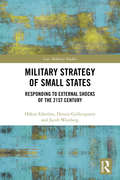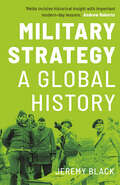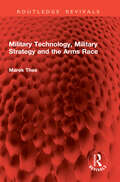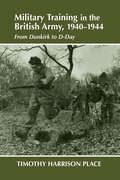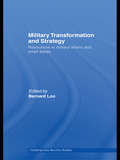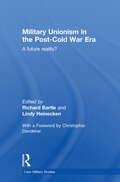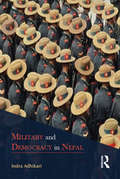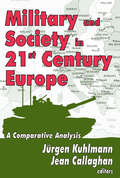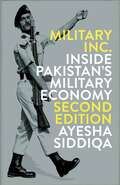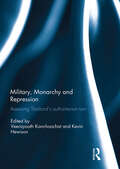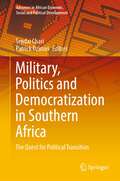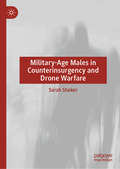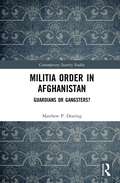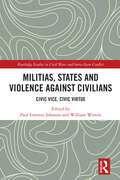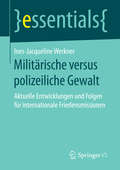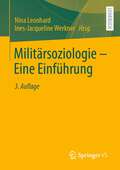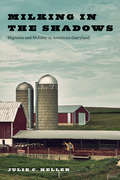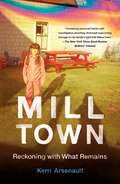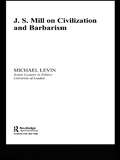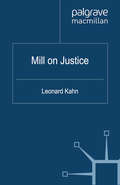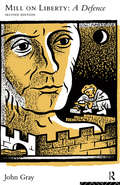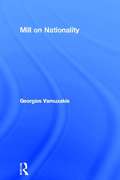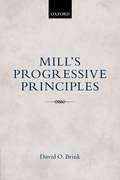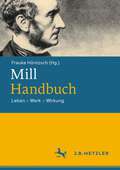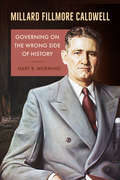- Table View
- List View
Military Strategy of Small States: Responding to External Shocks of the 21st Century (Cass Military Studies)
by Håkan Edström Dennis Gyllensporre Jacob WestbergThe book explores how small states adjust their military strategies in response to external shocks. Using primary sources from four Nordic countries, (Denmark, Finland, Norway, and Sweden), this volume explores how small states have adjusted their military strategies in response to external shocks of the 21st century. The 9/11 terrorist attacks, the Russian interventions in Georgia and Ukraine, and the rise of the Islamic State have all forced the Nordic states to adopt new strategies. While the responses have not been uniform, their differing relations to the EU and NATO have not prevented these countries from behaving similarly in military affairs. Limitations in military capacity has led all four countries to pursue strategies that include cooperation with more resourceful partners. It is necessary for them to cooperate with others to protect and promote their national interests. Moreover, the Nordic cosmopolitan outlook expresses milieu-shaping ambitions that we generally would not expect small states to pursue against a potential great power aggressor. This book will be of much interest to students of military strategy, defense studies, security studies, and international relations.
Military Strategy: A Global History
by Jeremy BlackA global account of military strategy, which examines the practices, rather than the theories, of the most significant military figures of the past 400 years Strategy has existed as long as there has been organised conflict. In this new account, Jeremy Black explores the ever-changing relationship between purpose, force, implementation and effectiveness in military strategy and its dramatic impact on the development of the global power system. Taking a &‘total&’ view of strategy, Black looks at leading powers — notably the United States, China, Britain and Russia — in the wider context of their competition and their domestic and international strengths. Ranging from France&’s Ancien Regime and Britain&’s empire building to present day conflicts in the Middle East, Black devotes particular attention to the strategic practice and decisions of the Kangxi Emperor, Clausewitz, Napoleon and Hitler.
Military Technology, Military Strategy and the Arms Race (Routledge Revivals)
by Marek TheeFirst published in 1986, Military Technology, Military Strategy and the Arms Race argues that a principal factor contributing to the arms race is the military research and development (R and D) sector. It traces the arms race since World War II and explores the relationship between the emergence of new weapon technology, the development of new weapon systems and their impact on strategic thinking. It considers the positions for both the United States and its allies in NATO and for the erstwhile Soviet Union. It argues that military R and D, which consumes an increasing proportion of total funds spent on R and D has developed a self-sustaining technological momentum, which is baked by a powerful military -industrial -bureaucratic- technological complex and is increasingly out of control of political leaders.The book argues that negotiations to limit the numbers of weapons fail to address the main problem, and that more emphasis should be given to considering ways of limiting and controlling military R and D. It concludes by proposing a radical shift in policy to achieve this. This historical reference work is important for scholars and researchers of military studies, defence studies, international relations, diplomacy and international politics.
Military Training in the British Army, 1940-1944: From Dunkirk to D-Day (Military History and Policy #No. 6)
by Dr Timothy Place Timothy Harrison PlaceIn this study, the author traces the reasons for the British Army's tactical weakness in Normany to flaws in its training in Britain. The armour suffered from failures of experience. Disagreements between General Montgomery and the War Office exacerbated matters.
Military Transformation and Strategy: Revolutions in Military Affairs and Small States (Contemporary Security Studies)
by Bernard LooThis book explores the idea of arevolution in military affairs (RMA), which underpins the transformational agenda of the US military, and examines its implications for smaller states.The strategic studies literature on the RMA tends to be American-centric and directed towards the strategic problems of the US military. This volume seeks to fill t
Military Unionism In The Post-Cold War Era: A Future Reality? (Cass Military Studies)
by Lindy Heinecken Richard BartleThis unique study of military unionism shows how the changing nature of present day conflicts has made soldier representation more important then ever. This new collection of essays clearly establish the key factors in the military union debate in recent years and highlight the mechanisms different armed forces have created to deal with the aspirations of their members. Core issues covered include: the nature of organizational and force restructuring since the end of the Cold War the new structures of military employment changes in value systems, such as rising individualism and the new culture of recruits legal, political, social and economic factors driving the debate. Placing military unionism in comparative perspective, these chapters provide the reader with an excellent basis for the examination of international military unionism from the viewpoint of countries with no unions, those recently unionised and those unionised for some time. This new book will be of great interest to students, researchers and professionals in military studies, defence management and sociology of the armed forces.
Military and Democracy in Nepal
by Indra AdhikariThis book explores the development of the military as an organization and looks at the patterns of civil–military relations that have emerged in modern Nepal, especially after the rise of King Prithvi Narayan Shah, who founded the unified state of Nepal. It combines astute analyses with up-to-date data to present a comprehensive account of the relations between monarchy, military and civil government and their impact on the democratization process in the country. The author underlines the pressing need for establishing civilian supremacy over the military, through developing and strengthening civilian supervisory mechanisms. The book will be an important resource to researchers, scholars, students of politics, military studies, peace and conflict studies, and history, particularly those concerned with Nepal. It will also interest policy-makers, security experts and military personnel.
Military and Society in 21st Century Europe: A Comparative Analysis
by Jürgen KuhlmannThis compendium on Europe's military situation is written by leading analysts of military studies representing every major nation of Europe. Also included are three overview chapters that set the tone for this volume. These chapters - Martin Shaw on the evolution of a ""common risk"" society, Christopher Dandeker on the military in democratic societies, and Wilfried von Bredow on the re-nationalization of military strategy - provide an introduction to the work.Although the Cold War is now two decades removed from Europe, the challenges of transition to new defense systems and institutional structures still confront those who plan the future for military establishments. The country studies as well as the final analysis of the trends and probable future developments in Europe should be required reading throughout the national security structure for politicians and decision makers seeking to understand the dilemmas facing European militaries and the societies they defend.The chapters cover a wide range of nations. Jean Callaghan, Christo Domoztov, and Valery Ratchcev examine the Bulgarian armed forces after the 1997 elections and Marie Vlachova and Stefan Sarvas review civil-military relations in the Czech Republic. Janos Szabo studies the defense sector in Hungary. Adriana Stanescu sees Romania as a case of delayed modernization. Vladimir Rukavishnikov studies the military in post-communist Russia. Paul Klein and Jürgen Kuhlmann review the German armed forces in the context of a peace dividend. Bernard Boene and Didier Danet consider France and the post draft situation. Marina Nuciari and Giuseppe Caforio consider the Italian military in a democratic context. Jan van der Meulen and his colleagues look upon the Netherlands military as a case study in post-modernization. The final contribution summarizes lessons learned in assessing the contemporary civil-military complex.
Military, Inc.: Inside Pakistan's Military Economy
by Ayesha SiddiqaPakistan occupies a paradoxical, even contradictory place in American foreign policy. Nominally a strategic ally in the war on terror, it is the third-largest recipient of US aid in the world. At the same time, it is run by its military and intelligence service—whose goals certainly do not always overlap with US priorities. <P><P> This book offers a close look at what the rise of the military has meant for Pakistani society. Ayesha Siddiqa shows how entrenched the military has become, not just in day-to-day governance, but in the Pakistani corporate sector as well. What are the consequences of this unprecedented merging of the military and corporate sectors? What does it mean for Pakistan’s economic development—let alone for hopes of an eventual return to democracy and de-militarization? <P><P>This new edition brings Siddiqa’s account fully up to date with a new preface and conclusion that emphasize the changing role of the media.
Military, Monarchy and Repression: Assessing Thailand's Authoritarian Turn
by Veerayooth Kanchoochat Kevin HewisonThailand’s politics has been contentious in recent years. With a military coup in 2006 and another in 2014, the country has moved from being a promising electoral democracy to a military dictatorship. Electoral politics was embraced enthusiastically by some groups, including those in rural areas of the north and northeast, but came to be feared by groups variously identified as the old elite, royalists and the establishment. The transition to authoritarianism saw large and lengthy street protests and considerable violence. This book examines the background to and the sources of conflict and the turn to authoritarianism. It addresses: the return of the military to political centre stage; the monarchy’s pivotal role in opposing electoral democracy; the manner in which sections of civil society have rejected electoral politics; and the rise of powerful non-elected bodies such as the Constitutional Court.
Military, Politics and Democratization in Southern Africa: The Quest for Political Transition (Advances in African Economic, Social and Political Development)
by Tendai Chari Patrick DzimiriThis book explores multiple challenges faced by democratization in Southern Africa. Applying a wider lens to the concept of political transition and employing a variety of theoretical and methodological approaches, the contributions gathered here explore residual political cultural practices that hinder democratic consolidation in Southern Africa. Presenting various case studies, the book tackles themes such as the military-political nexus, leadership renewal, constitutionalism, electoral politics, election violence, marginalization of women, civil society and political transition, media framing and transitional justice. Written from a multidisciplinary perspective and drawing on empirical data from multiple sources, this edited volume challenges orthodox conceptualizations of political transition. The book will be of interest to students and scholars of political science, African studies, and related fields, as well as policy-makers and professionals interested in the latest political developments in Southern Africa.
Military-Age Males in Counterinsurgency and Drone Warfare
by Sarah ShokerThis book documents the political ecosystem that legitimized violent military action against military-age males in US military operations after September 11, 2001. It first introduces the military-age male as a category used to identify insurgent combatants who have blended into civilian environments. Though US officials maintained that military-age males were not automatically assumed to be combatants, defense and intelligence professionals nevertheless used biases related to gender, age, religion and race to interpret the battlespace. Based on an analysis of the Obama administration’s decision to exclude adolescent boys and men from drone warfare’s collateral damage count, and an examination of similar problems with combatant identification under the Bush administration, the author argues that the military-age male category contributed to the deterioration of civilian protection. The concluding chapters discusses the link between counterinsurgency, drone warfare, and emerging trends in artificial intelligence and autonomy in weapons systems, highlighting the relation between algorithmic discrimination and the misidentification of civilians as combatants.
Militia Order in Afghanistan: Guardians or Gangsters? (Contemporary Security Studies)
by Matthew P. DearingThis book offers a new insight into when and why paramilitary groups in Afghanistan engage in protective or predatory behavior against the civilians they purportedly defend. In Afghanistan’s counterinsurgency environment, America leaned on militias to provide order and stabilize communities cut off from weak central government institutions. However, the lucrative market of protection challenged militia loyalty, as many engaged in banditry, vendettas, and predation. This book examines the varying militia experiments in Afghanistan from 2001 to 2020 and their outcomes through three sub-national case studies. It argues that successful militia experiments in Afghanistan involved inclusion of local orders, where communities had well-established social structures and accountability mechanisms in place, and state patrons relied upon those structures as a restraint against militia behavior. Complementary management ensured patrons leaned on communities for strong accountability systems. But such environments were far from the norm. When patrons ignored community controls, militias preyed on civilians as they monopolized the market of protection. This book adds to the rich literature on the U.S. experience in Afghanistan, but differs by focusing on the interplay between states, communities, and militias. This book will be of much interest to students of military and strategic studies, Asian politics, security studies and International Relations.
Militias, States and Violence against Civilians: Civic Vice, Civic Virtue (Routledge Studies in Civil Wars and Intra-State Conflict)
by Paul Lorenzo Johnson William WittelsThis book examines the conditions under which the presence and use of militias result in an increase or a decrease in violence against civilians in intra-state conflicts. Showcasing the breadth and diversity of modern militias in the context of violence against civilians, the volume addresses the predation and repression that many such groups are infamous for, as well as increasingly important efforts by other militias at civilian protection in war-torn settings. The chapters examine militias from around the world, drawing on both qualitative and quantitative methods as they cover groups as varied as gangs, death squads, grassroots community-defense groups, official state militias, and party-sponsored armies – groups on the "civic vice" side, the "civic virtue" side, and the wide and mixed in-between space where most cases fall. Taken as a cohesive unit, the work lays the foundation for an encompassing theory and interrogation of the causal chain between militia type and operating context and the levels of violence against civilians. It provides path-breaking theory-building and empirical scholarship. Policymakers and national security practitioners dealing with issues relating to armed groups will also benefit from the practical issues covered here, such as how different forms of sponsorship and training affect militia behavior. This book will be of interest to students of civil wars, political violence, counterinsurgency, civil-military relations, and security studies in general.
Militärische versus polizeiliche Gewalt: Aktuelle Entwicklungen und Folgen für internationale Friedensmissionen (essentials)
by Ines-Jacqueline WerknerInes-Jacqueline Werkner verhandelt in diesem essential die Frage der kategorialen Unterscheidung militärischer und polizeilicher Gewaltanwendung und deren Folgen für internationale Friedensmissionen. Sie greift damit einen in friedensethischen Debatten zunehmend diskutierten Punkt auf, nämlich welchen Beitrag Polizeikräfte zur Konfliktbearbeitung und internationalen Rechtsdurchsetzung leisten können. Im Fokus dieser Überlegungen steht das Ziel der Gewaltdeeskalation. So würden sich Polizeieinheiten aufgrund ihres Aufgabenprofils und ihrer Ausstattung deutlich vom Militär unterscheiden. Diese Annahmen, aber auch der zugrundeliegende Begriff der Gewalt und die rechtlichen Rahmenbedingungen werden in diesem essential erörtert.
Militärsoziologie – Eine Einführung
by Ines-Jacqueline Werkner Nina LeonhardDas Buch bietet eine Einführung in das Forschungsgebiet der Militärsoziologie. Es richtet sich an Studierende, aber auch an interessierte Wissenschaftlerinnen und Wissenschaftler, die sich einen Überblick über die aktuelle sozialwissenschaftliche Forschung zum Militär verschaffen wollen. Da sich mit dem Gegenstand "Militär" unterschiedliche Fachdisziplinen beschäftigen, sind die Beiträge interdisziplinär ausgerichtet. In verschiedenen Kapiteln werden zentrale Themen und Fragestellungen vorgestellt und an empirischen Beispielen diskutiert.
Milking in the Shadows: Migrants and Mobility in America’s Dairyland (Inequality at Work: Perspectives on Race, Gender, Class, and Labor)
by Julie C. KellerMigrant workers live in a transnational world that spans the boundaries of nation-states. Yet for undocumented workers, this world is complicated by inflexible immigration policies and the ever-present threat of enforcement. Workers labeled as “illegals” wrestle with restrictive immigration policies, evading border patrol and local police as they risk their lives to achieve economic stability for their families. For this group of workers, whose lives in the U.S. are largely defined by their tenuous legal status, the sacrifices they make to get ahead entail long periods of waiting, extended separation from family, and above all, tremendous uncertainty around a freedom that many of us take for granted—everyday mobility. In Milking in the Shadows, Julie Keller takes an in-depth look at a population of undocumented migrants working in the American dairy industry to understand the components of this labor system. This book offers a framework for understanding the disjuncture between the labor desired by employers and life as an undocumented worker in America today.
Mill Town: Reckoning with What Remains
by Kerri ArsenaultA galvanizing and powerful debut, Mill Town is an American story, a human predicament, and a moral wake-up call that asks: what are we willing to tolerate and whose lives are we willing to sacrifice for our own survival?Kerri Arsenault grew up in the rural working class town of Mexico, Maine. For over 100 years the community orbited around a paper mill that employs most townspeople, including three generations of Arsenault’s own family. Years after she moved away, Arsenault realized the price she paid for her seemingly secure childhood. The mill, while providing livelihoods for nearly everyone, also contributed to the destruction of the environment and the decline of the town’s economic, physical, and emotional health in a slow-moving catastrophe, earning the area the nickname “Cancer Valley.”Mill Town is a personal investigation, where Arsenault sifts through historical archives and scientific reports, talks to family and neighbors, and examines her own childhood to illuminate the rise and collapse of the working-class, the hazards of loving and leaving home, and the ambiguous nature of toxins and disease. Mill Town is a moral wake-up call that asks, Whose lives are we willing to sacrifice for our own survival?
Mill on Civilization and Barbarism
by Michael LevinJohn Stuart Mill's best-known work is On Liberty (1859). In it he declared that Western society was in danger of coming to a standstill. To understand how Mill came to this conclusion requires one to investigate his notion of the stages from barbarism to civilisation, and also his belief in imperialism as part of the civilising process. This study encompasses discourses on the blessings, curses and dangers of modernisation from approximately the time of the American and French revolutions to that of the so-called mid-Victorian calm in which On Liberty was written. Current political issues concerning the West and Islamic countries have heightened interest in just the kind of question that this book discusses: that of how the West relates to, and assesses, the rest of the world.
Mill on Justice (Philosophers in Depth)
by L. KahnJohn Stuart Mill was one of the most important figures in political philosophy but little has been published on his ideas on justice. This impressive collection by renowned Mill scholars addresses this gap in Mill studies and theories of justice.
Mill on Liberty: A Defence
by John GrayMill on Liberty was first published in 1983 and has become a classic of Mill commentary. The second edition reproduces the text of the first in full, and in paperback for the first time. To this, John Gray adds an extensive postscript which defends the interpretation of Mill set out in the first edition, but develops radical criticisms of the substance of Millian and other liberalism.The new edition is intended as a contribution to the current debate about the foundations of liberalism, and it looks closely at the recent seminal contributions to liberal thought by Raz, Feinberg, Rawls and Berlin. Central to its argument is Gray's contention that, like other liberalisms that ground themselves on an ideal of autonomy or individuality, Millian liberalism has a Eurocentric bias that cannot be given rational justification. Gray addresses the question of whether any form of liberal theory, can, in fact, avoid the bias, and concludes that it cannot.This book will be indispensable both to those familiar with On Liberty and to those coming to it for the first time. In addition, the book will also be of great interest to moral and political theorists, to students of law and jurisprudence and to intellectual historians.
Mill on Nationality (Routledge/PSA Political Studies Series)
by Georgios VarouxakisJohn Stuart Mill's thought has been central in recent (as well as older) works of political theory discussing the relationship between liberal democratic politics and nationality or nationalism -- which is far from surprising, given his undisputed influence on liberal attitudes towards nationality from the 1860s to the present. This book provides the first thorough critical study of the attitude of this pillar of the liberal tradition towards nationality, nationhood, patriotism, cosmopolitanism, intervention/non-intervention, and international politics more generally. Based on exhaustive research in a great range or writings by Mill, as well as by his contemporaries and later students, it establishes for the first time clearly and subtly where exactly Mill stood with regard to nationhood, nationalism, patriotism, cosmopolitanism, national self-determination, intervention/non-intervention and other important issues in international ethics. It thus exposes and challenges all sorts of misconceptions, half-truths, or myths surrounding Mill's views on, and attitude towards, nationality and related issues in a vast literature from the mid-nineteenth to the beginning of the twenty-first century. At the same time, it offers a timely contribution to contemporary debates among political theorists on the relationship between liberal democratic values and nationalism, patriotism and cosmopolitanism, not least through its articulation of a distinct sense in which patriotism and cosmopolitanism can be compatible and mutually reinforcing (based on Varouxakis's interpretation of Mill's thought on this question). The reader will find critical discussions of the pronouncements on some of the issues examined (or on Mill's contributions to them) of some of the most important late-twentieth-century political theorists as well as of contemporaries or near-contemporaries of Mill.
Mill's Progressive Principles
by David O. BrinkIn Mill's Progressive Principles David Brink provides a systematic reconstruction and assessment of John Stuart Mill's contributions to the utilitarian and liberal traditions, examining his first principles and their application to issues of representative democracy and sexual equality. Brink defends novel interpretations of key elements in Mill's moral and political philosophy, including his concepts of motivation, happiness, duty, proof, harm and the harm principle, freedom of expression, anti-paternalism, representative democracy and weighted voting, and sexual equality. However, the most distinctive aspect of this account of Mill's commitments is the case it makes for a perfectionist reading of his conception of happiness and the significance this has for other aspects of his moral and political philosophy. On this perfectionist conception, the chief ingredients of happiness involve the exercise of a person's capacities for practical deliberation and decision that mark us as progressive beings. Once this perfectionist theme is made explicit, it can be shown to be central to Mill's views about utilitarianism, liberalism, rights, democratic government, and sexual equality.
Mill-Handbuch: Leben – Werk – Wirkung
by Frauke HöntzschJohn Stuart Mill (1806–1873) gehört im angelsächsischen Raum seit jeher zu den Klassikern der Ideengeschichte. Aber auch im deutschsprachigen Raum wird er immer stärker rezipiert: Viele seiner Hauptschriften wurden neu editiert, sein Denken erfreut sich über die disziplinären Grenzen hinweg bis hinein in die Feuilletons wachsender Aufmerksamkeit. Das liegt nicht zuletzt an Mills ungewöhnlich undogmatischer Denkhaltung, die sich in der Berücksichtigung und Synthese verschiedenster Denkrichtungen niederschlägt. Seine Schriften zeugen von einem differenzierten Blick auf gesellschaftspolitische Zusammenhänge, was sie auch für moderne Debatten vielfältig anschlussfähig macht. Das Handbuch stellt John Stuart Mills Leben, die wichtigsten Einflüsse auf sein Denken, sein Werk und die zentralen Konzepte sowie die Rezeption seines Denkens im Rahmen unterschiedlicher Diskurse vor.
Millard Fillmore Caldwell: Governing on the Wrong Side of History (Florida in Focus)
by Gary R. MorminoWhen actions of the past clash with the values of today Millard Fillmore Caldwell (1897–1984) was once considered one of the greatest Floridians of his generation. Yet today he is known for his inability to adjust to the racial progress of the modern world. In this biography, leading Florida historian Gary Mormino tackles the difficult question of how to remember yesterday’s heroes who are now known to have had serious flaws.The last Florida governor born in the nineteenth century and the first to govern in the atomic age, Caldwell was beloved in his time for leading the state through the hard years of World War II. He was wildly successful in a political career that may never be matched, serving as governor, congressman, state legislator, and chief justice of the Florida Supreme Court. He passed important educational reform legislation. But his attitudes toward race and citizenship strike Americans today as embarrassing and shocking. He refused to address black leaders by their titles. He argued for segregated bomb shelters. And he accepted lynching as part of the southern way of life.Mormino measures the contributions of Caldwell alongside his glaring faults, discussing his complicated role in shaping modern Florida. In the current debates surrounding public memorials and historical memory in the United States, Millard Fillmore Caldwell is a timely example of one man’s contested legacy. A volume in the series Florida in Focus, edited by Andrew K. Frank
